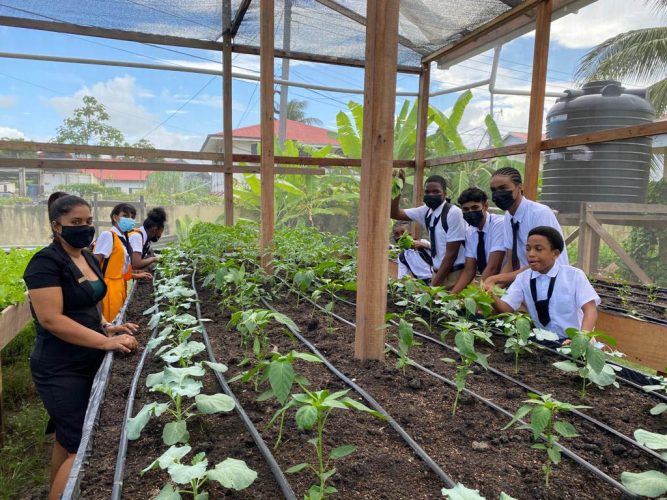‘Teacher Sharon’, Kumawattie Ramkoomar Isurdeen, is a quiet, unassuming young woman who serves as Head of the Department of Agriculture Science at Cummings Lodge Secondary School and who believes that the drive to enhance her charges’ enthusiasm for the discipline has to be designed to take them beyond seeing it as just another subject to add to their list of CXC ‘conquests’.
She believes that over time the discipline of Agriculture Science has become sufficiently important to Guyana’s economy and to its food security ambitions to cause it to play a greater role on the school curriculum. That is why she is advocating that the teaching of Agriculture Science in schools be taken to ‘the next level’. It is time, she says, that the cultivation of crops and the rearing of livestock as subjects on the school curriculum benefit from a level of technological application that compares favourably with that which applies in the substantive agricultural sector.

Teacher Sharon wants to take that ambition further. It is time, she believes, that, again as part of the curriculum, children be provided with information regarding the various career paths that might be open to them in the agriculture sector. This year, twelve students will be sitting Agriculture Science at the CXC examination. In 2023, that number is expected to increase to thirty six. One of her more avid students, she says, has persuaded her father to clear a portion of their yard where she has started a garden.
If her story might sound unexciting to the uninitiated, Sharon considers where she is today to amount to a major breakthrough. When she first arrived at Cummings Lodge Secondary she had encountered a group of downright disinterested children. She quickly discovered that part of the problem had to do with the fact that for the students, Agriculture Science had come to be associated purely with cultivating and tending. The harvesting season was invariably attended by incessant rainfall.
After she had been promoted to the position of Head of Department in 2021, Sharon decided to push for the erection of a Shadehouse. With the Shadehouse up and running the students began planting and marketing their produce.
Crop production is one of the key skills sets associated with the discipline. Students, she says, are required to make seed beds, transplant, generate data on the growth of the crop weekly, harvest, market and prepare cost analyses. In the area of livestock, children favour rearing chickens and collecting and grading eggs.
In the area of cultivation the children favour celery, tomato, and lettuce. Last week, in partial fulfillment of their School-based Assessments (SBAs), the students reaped and sold the fruits of their labour. The receivables are ploughed back into the school’s Agriculture Department.
These days, the Essequibo-born teacher believes that her efforts have made a major contribution to the transformation of Agriculture Science into one of the more popular disciplines at Cummings Lodge Secondary school.
The outcomes of her efforts have persuaded Sharon to reach out to her colleagues teaching Agriculture Science in other parts of the country to move to erect Shadehouses. She believes that given the extent of Guyana’s agriculture sector and the contribution it makes to food security, every school should have a farm. “I recommended shadehouse farming due to the challenge of climate change… crops are protected from harsh weather conditions.”
Schools that have no farms have the option of going to Practical Instruction Centres to do their SBAs but costs are a deterrent here.
Teacher Sharon agrees that some students sit Agriculture Science as a “make up” subject.” That, she believes, can change.






